| Manufacturer: | Scratch |
BIG BLUE DOG
Unique Cluster and Unique Fins
by Nick Esselman
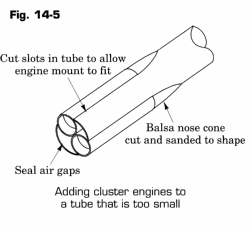
 It all started when I saw a two-motor cluster in
Apogee's
"Model Rocket Design and Construction" by Timothy S. Van Milligan
that I liked the looks of. I then decided to build a model with that motor
configuration, which became my 2x18mm motor
Red Dog. Then after numerous successful flights, I decided
that I should upscale it. That led me to this 2.6"-airframe rocket that I
have been calling Big Blue Dog (for lack of a better name...yet).
It all started when I saw a two-motor cluster in
Apogee's
"Model Rocket Design and Construction" by Timothy S. Van Milligan
that I liked the looks of. I then decided to build a model with that motor
configuration, which became my 2x18mm motor
Red Dog. Then after numerous successful flights, I decided
that I should upscale it. That led me to this 2.6"-airframe rocket that I
have been calling Big Blue Dog (for lack of a better name...yet).
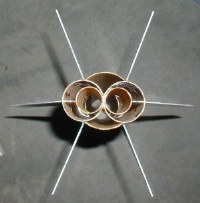 I didn't really want to
build one this big, but had to work with available tube sizes to get the right
airframe to pod ratio, hence the 2.6" airframe and 1.9" pods. This
ratio, which is 1.33:1, allows for half of the pod tubes to be exposed. So, the
2.7x upscale project begins.
I didn't really want to
build one this big, but had to work with available tube sizes to get the right
airframe to pod ratio, hence the 2.6" airframe and 1.9" pods. This
ratio, which is 1.33:1, allows for half of the pod tubes to be exposed. So, the
2.7x upscale project begins.
COMPONENTS:
I purchased most of the stuff new with the exception of the
nose cone and recovery system. The nose cone was left over from an ill-fated
THOY Snipe and the recovery is just left over from time in
the hobby (various rockets). The remaining components follow:
- (2) 2.6" x 36" Phexible Phenolic Tubes (sized to 18", 18", and 32")
- (1) 2.6" Bulkhead Kit
- (1) 2.6" x 8" Coupler (you may need to by 36" piece)
- (1) 2.6" x ?" Nose Cone (your choice on style/length, mine was 13" long)
- (2) 1.9" x 12" Tubes (Aerotech)
- (1) 1.9" x 9" Nose Cone (Aerotech Mustang size)
- (1) 29mm x 12" Phenolic Motor tube (sized to 6" and 6")
- (4) Small Fins (G10 0.093") [click for fin pattern]
- (2) Large Fins (G10 0.093") [click for fin pattern]
- Misc (builder's choice) Hardware
- Eye-Bolt(s)
- Launch Lugs/Buttons
- Shock Tether(s) / Cord(s)
- Parachute(s)
- Motor Retention
I bought my Phenolic tubing, bulkheads and couplers from Missile Works. I bought my Aerotech 1.9" tubing and nose cone from Hobby Connection. I purchased my fin stock and had them custom cut by Public Missiles.
CONFIGURATION:
The Misc Hardware depends on the configuration you use for recovery. The rocket
could be set up for motor recovery, however, I decided to build mine with
altimeter-based dual deployment.

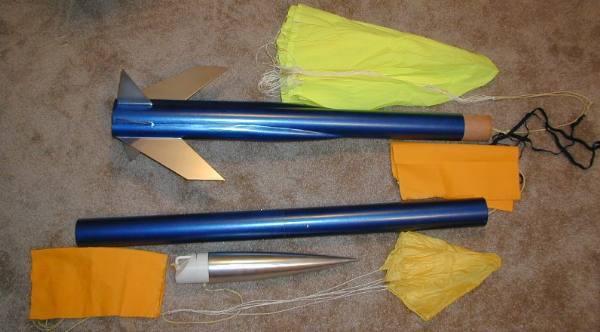
(note my Drogue and Main are in the wrong place in this picture)
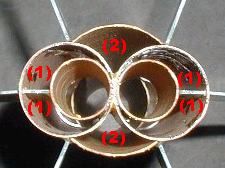 NOTE:
If you build the rocket for motor recovery:
NOTE:
If you build the rocket for motor recovery:
- The bottom sections (1 & 2) will need to be closed off to prevent your ejection charge/gases from escaping out the back without deploying your parachute. This may be a good place for 2-part foam. The closer to the top of the motor tube the better (reducing the volume). Here is where 12" motor tubes would be best and then fill at the top before installing the half pod-cone.
- Ensure that you use ample epoxy and fillets on the "flaps" of the main body tube. The ejection charge may be too much and cause this to blow out (see my motor Red Dog article)
- HOWEVER, if you will be using Single-Use motors with the ejection charge removed, then you may want to leave this open (as I did) since there will be some left over BP and this will allow it to blow out the back freely.
CONSTRUCTION:
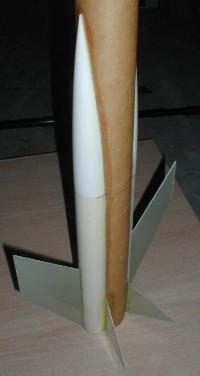 Click here to see three
pages of step-by-step construction details. [CLICK]
Click here to see three
pages of step-by-step construction details. [CLICK]
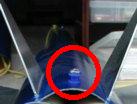 I used a couple of
Matt's Rail Buttons instead of lugs, thereby making this a
"rail" only rocket. Notice how nice the blue ones match the finish of
my kit?
I used a couple of
Matt's Rail Buttons instead of lugs, thereby making this a
"rail" only rocket. Notice how nice the blue ones match the finish of
my kit?
I used my standard method for finishing Kraft paper tubes and also for finishing plastic nose cones. I painted it in a hurry to get it ready for a launch and am unhappy with the silver and blue scheme. I plan on re-painting it, spending extra time emphasizing the pods. I do like the nose cone and fins being a highly reflective paint. I may go with gold next time.
 FLIGHT/RECOVERY:
FLIGHT/RECOVERY:
My recommended motors are G35's and G80's, however, it could also be flown on F40's, F52's, and G64's if you have two 29mm RMS sets. My current altitude ratings are:
- G35 = 1011 feet
- G80 = 1562 feet
These altitudes are based on a finished rocket weighing in at 49 ounces (including the altimeter). My rocket's entire length is 81". The CG of the rocket is 35 ½" from the rear including the altimeter. The CG without the altimeter is 31 ¾" from the rear. CG's were measured without motors.
My first attempt was at a Frontier Launch in Massachusetts. I had borrowed a second 29/40-120 reload case and had loaded up two (2) F40's. After three attempts, these two motors would not light. So it never flew that day.
The next opportunity was at NARAM-43. I loaded the rocket with two (2) G35's and set up my G-Wiz Altimeter. Both motors lit and off she went! It was great and very exciting to me. Finally! Although both parachutes deployed at apogee, it was still a success (just not perfect).
Also at NARAM-43, I was able to launch it on two (2) G80's. Fast and straight as an arrow. Again, both parachutes deployed and I never got an altitude reading due to a battery drain issue.
The third flight occurred at the 3 Oaks launch in Michigan. With two (2) G80's and now carrying a Missile Works RRC2 Altimeter (the NARAM corn field appears to have eaten my G-Wiz even though it coughed up the rocket it was in at the time). It was another solid and straight boost despite the wind that day. This time it was picture perfect and had a successful dual-deployment. I didn't notice until I got home, but I had lost a small fin on this flight.
Most know that I'm not a big altitude guy and would be comfortable in a 2000 foot ceiling launch. This rocket with G motors fits this to a "T".
Below is the output of the EMRR Flight Log on my Big Blue Dog:
SUMMARY:
I need to replace the missing fin and give it a better paint job and I'll be
looking forward to flying the Big Blue Dog again. Oh, yes, possibly even give
it a new name. If anyone has an interest in building this rocket, I would be
willing to kit it for them.
- PRO's:
- Very Stable (due to length)
- 29mm Cluster
- With G motors stays under 2000 feet
- Utilizes a Pod Design (unique)
- Unique Fin configuration
- CON's:
- Some have expressed concern over main fin flutter
- Fins are sharp
- Short motor tubes (should use 9" for altim, or 12" for motor recovery)
* The image at the top to this article is from "Model Rocket Design & Construction" and is used with permission from Apogee Components. This book can be purchased at: Apogee Components
Sponsored Ads
 |
 |
